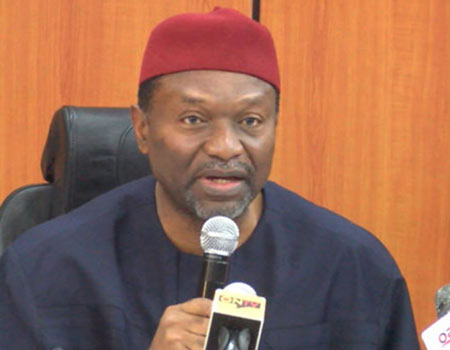
The Federal Government has forecast that the economy would grow by 2.2 per cent this year, even as it says it is already looking beyond recession.
The government’s forecasts, seen by Reuters on Thursday, are contained in a document titled: 2018-2020 Medium Term Fiscal Framework and Strategy Paper, which forms the basis for its 2018 budget, dated July 27.
According to the Minister of Budget and National Planning, Senator Udoma Udo Udoma, at the inauguration of a Joint Planning Committee for the 23rd Nigerian Economic Summit in Abuja on Thursday, Nigeria is already looking beyond current economic recession towards growth and development.
The document seen by Reuters indicates that Nigerian government projects a big bounce back, to 2.2 per cent this year, 4.8 per cent in 2018 and 4.5 per cent in 2019, before reaching 7 per cent in 2020.
The economy slipped into a recession in 2016 as low crude prices and oil production slashed government revenues, caused dollar shortages and crippled its economy.
It contracted 0.5 percent in the first quarter, its smallest fall in five quarters of decline.
The International Monetary Fund, however, is not so bullish, saying on Wednesday it expects Nigeria’s economy to grow by 0.8 percent this year, with threats to growth remaining elevated.
It saw significant revenue shortfalls in the first half of 2017, with interest payments remaining as high as 40 percent at end of June.
Nigeria estimates record spending of N7.94 trillion ($21.75 bln) next year, up 6.7 per cent from the sum budgeted for 2017 with deficit rising to 2.45 percent as a percentage of GDP.
The government projects the naira’s exchange rate to the dollar, which has traded at around 305 on the interbank market since 2016, to remain stable while inflation will decline but remain in double-digits at 12.42 percent next year.
Nigeria expects oil production to hit 2.3 million barrels per day and price at $45 per barrel. It said oil production reached 1.9 million barrels between January to June 2017 including condensates.
Udoma, at the inauguration of the committee, said while national debates in the past had centred around how the country could get out of recession, such was no longer the case with the adoption of the ERGP.
The theme of this year’s summit, which is to hold in October is “Actualising the Economic Recovery and Growth Plan: Opportunities, productivity and employment.”
As the country is already on its way out of economic recession, Udoma said effort of the Federal Government has shifted to building the current momentum of the growth movement.
“The 23rd Nigerian Economic Summit is coming at a time when the national debate is no longer about how to get out of recession-we are already moving in that direction with the adoption of the ERGP.
“Focus will therefore be on specific sectors such as infrastructure, manufacturing, renewable energy, housing, agric-business, creative industries, retail trade and digitalisation.
“The summit will essentially be used to see how we can intensify efforts to implement the ERGP to create opportunities, tackle unemployment and improve productivity in Nigeria.”
While explaining that the summit would complement Federal Government’s effort to create over 15 million direct jobs by 2020 through agriculture, manufacturing, construction, and services among others, Udoma said the summit would be used to get stakeholders’ commitments toward a private sector led investment approach as set out in the ERGP.
Also speaking at the occasion, Chief Executive Officer, Nigerian Economic Summit Group, Mr Laoye Jaiyeola, promised that his committee will deliver a summit that would meet all expected outcomes.
According to him, the committee will use the summit to promote and support the actualisation of the ERGP.



